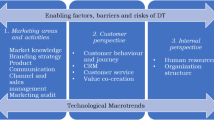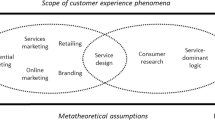Abstract
To process and draw value from their customer databases, firms set up information systems based on informational processes which make it possible to turn data into information and knowledge for action. Technical and cognitive knowledge is necessary but difficult to master, which leads some firms to opt for outsourcing. This research draws on the study of a supermarket retailer that engaged an IT services firm specializing in the study of large commercial databases to perform all aspects of management control related to its jewelry sales activity. A value chain for the inter-organizational information process was identified, showing the importance and fragility of the subprocess of knowledge transfer between the two entities.



Similar content being viewed by others
Notes
For reasons of confidentiality, the specialist data processing company is referred to as S and the client firm, a supermarket retailer, as R.
The principle is that articles are displayed in windows with reference numbers; the customer enters the number on a small screen to see full product details.
Top sales by turnover, margin, and quantity.
According to the management controller from S seconded to R.
Pearl necklaces, for instance, sell well in the Paris area but not in the south of France.
References
Alavi, M., & Leidner, D. (2001). Knowledge management and knowledge management systems: conceptual foundations and research issues. MIS Quaterly, 25(1), 107–137.
Almeida, P., & Kogut, B. (1999). Localization of knowledge and the mobility of engineers in regional networks. Management Science, 45, 905–917.
Argote, L., Mc Evily, B., & Reagans. (2003). Introduction to the special issue on managing knowledge in organizations: creating, retaining, and transferring knowledge. Management Science, 49(4), 5–8.
Argote, L., & Ingram, P. (2000). Knowledge transfer: a basis for competitive advantage in firms. Organizational Behavior and Human Decision Processes., 82(1), 150–169.
Argyris, C., & Schön, D. (1978). Organizational learning: a theory of action perspective. Reading Mass: Addison Wesley.
Bhatt, G. D. (2001). Knowledge management in organizations: examining the interactions between technologies, techniques, and people. Journal of Knowledge Management, 5(1), 68–75.
Bollecker, M. (2002). Le rôle des contrôleurs de gestion dans l’apprentissage organisationnel: une analyse de la phase de suivi des réalisations. Comptabilité Contrôle Audit, 2(8), 109–126.
Brown, J., & Duguid, P. (1998). Organizing knowledge. California Management Review, 40(3), 90–111.
Clark, K. B., & Fujimoto, T. (1991). Product development performance: strategy, organization and management in the world auto industry. Cambridge: Harvard Business School Press.
Cohen, W., & Levinthal, D. (1990). Absoptive capacity: a new perspective on learning and innovation. Administrative Science Quaterly, 35, 128–152.
Easterby-Smith, M., Lyles, M. L., & Tsang, E. W. (2008). Inter-organizational knowledge transfer: current themes and future prospects. Journal of Management Studies, 45(3), 677–690.
Gittelman, M., & Kogut, B. (2003). Does good science lead to valuable knowledge ? Biotechnology firms and the evolutionary logic of citation patterns. Management Science, 49(4), 366–382.
Hendersen, R., & Cockburn, I. (1994). Measuring competence? Exploring firm effects in pharmaceutical research. Strategic Management Journal, 15, 63–84.
Huber, G. (1991). Organizational learning: the contributing processes and literature. Organization Science, 2(1), 88–115.
Jansen, J. J. P., Bosch, F. A. J., & Volberda, H. W. (2005). Managing potential, and realized absorptive capacity: how do organizational antecedents matter? Academy of Management Journal, 48(6), 999–1015.
Krugman P. (2006), Économie internationale, Pearson Education
Lopez, V. W. B., & Esteves, J. (2011). Acquiring external knowledge to avoid wheel re-invention. Journal of Knowledge Management, 17(1), 87–105.
Merton, R. K., Fiske, M., & Kendall, P. L. (1990). The focused interview. New York: Free Press.
Nonaka, I., & Konno, N. (1998). The concept of ‘BA’: building a foundation for knowledge creation. California Management Review, 40(3), 40–54.
Nonaka, I. (1994). A dynamic theory of organizational knowledge creation. Organization Science, 5(1), 14–37.
OECD. (2013). New sources of growth: knowledged-based capital. Key analysis and policy conclusions (Synthesis Report).
Paillé, P., & Mucchielli, A. (2008). L’analyse qualitative en sciences humaines et sociales (2nd ed.). Paris: Armand Colin.
Pentland, B. T. (1995). Information systems and organizational knowledge systems. Accounting, Management and Information Technologies, 5(1), 1–21.
Porter, M. (1982). Choix stratégiques et concurrence, techniques d’analyse des secteurs et de la concurrence dans l’industrie. Paris: Economica.
Roussel, P., Wacheux, F. (Ed.) (2005) Management des ressources humaines : méthodes de recherche en sciences humaines et sociales, De Boeck.
Song, J., Almeida, P., & Wu, G. (2003). Learning by hiring: when is mobility more likely to facilitate interfirm knowledge transfer? Management Science, 49(4), 351–365.
Spiegler, I. (2003). Technology and knowledge: bridging a ‘generating’ gap. Information and Management, 40, 533–539.
Szulanski, G. (1996). Exploring internal stickiness: impediments to the transfer of best practice within the firm. Strategic Management Journal, 17, 17–23.
Tsang, E. W. K. (2013). Case study methodology: causal explanation, contextualization.
Van Wijk, R., Jansen, J. J., & Lyles, M. A. (2008). Inter-and intra-organizational knowledge transfer: a meta-analytic review and assessment of its antecedents and consequences. Journal of Management Studies, 45(4), 830–853.
Von Hippel, E. (1994). Sticky information and the locus of problem solving: implication for innovation. Management Science, 40, 429–439.
Woiceshyn, J., & Falkenberg, L. (2008). Value creation in knowledge-based firms: aligning problems and resources. Academy of Management, 22(2), 85–99.
Yin, R. (2003). Case study research: design and methods. London: Sage Publication.
Author information
Authors and Affiliations
Corresponding author
Appendix 1
Appendix 1
Rights and permissions
About this article
Cite this article
Janicot, C., Mignon, S. & Walliser, E. Information Process and Value Creation: an Experimental Study. J Knowl Econ 7, 276–291 (2016). https://doi.org/10.1007/s13132-015-0306-z
Received:
Accepted:
Published:
Issue Date:
DOI: https://doi.org/10.1007/s13132-015-0306-z




